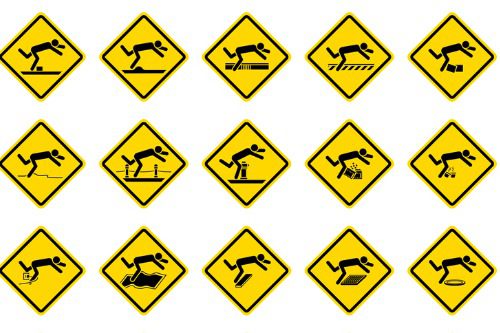Research finds lack of awareness for workplace slips, trip and falls

New research report finds lack of awareness for workplace slips, trips and falls represents a significant risk to businesses and employees
A new report into workplace slips, trips and falls (STF) has been published today by accident prevention charity, The Royal Society for the Prevention of Accidents (RoSPA) and insurer, RSA. The report found that there is worrying lack of awareness towards the dangers of workplace STF and the significant impact (both cost and time), that these incidents can have on businesses and their employees.
The research, which canvassed the opinions of nearly 3,000 people, found that 60% of decision makers don’t have a dedicated STF prevention programme in place. A number of businesses reported losing in excess of 100,000 hours (4,167 days) working time a year due to STF and data from RSA indicates that the average claim for a slip, trip or fall is £25,000.
The report which was conducted to add to the existing pool of evidence relating to workplace STF and to explore new and emerging issues in this area. It is also hoped the research could inform attitudes and behaviours to falls and help businesses better manage this risk. This survey is an extension of RSA and RoSPA’s Fall Fighter initiative, launched in October 2021, aimed at tackling falls in the home.
The study also looked at a number of reasons for an increased likelihood of workplace STF. One key issue was the average age of the workforce.
The age of the workforce is increasing (employment rate for people aged 50 to 64 along has risen from 56% in 1993 to 73% in 2020 – Why older workers are the future | Centre for Ageing Better) and while this is good for businesses and employees alike, 53% of respondents believed that falls were inevitable, as people get older.
The lack of attention given to the risk was stark. One reason for this was the potential that businesses and people are being distracted by macro events outside of their control including COVID, inflation and the war in Ukraine. This was clearly highlighted with almost 10% of the sample giving negative and hostile responses when asked if their business had an STF problem. Comments which included “stupid idea” and “Nothing. I’ve never heard of STF before and the fact it’s even a ‘thing’ shows someone has got too much time on their hands. There are real problems and challenges for employers and employees to deal with without making new ones up” show it was not viewed high enough on the agenda for some.
The findings clearly show preventative measures are badly needed and respondents were also asked for their view on what methods are considered effective and ineffective for preventing STF. These recommendations included:
Basic housekeeping standards are recognised as fundamentally important in the workplaceTraining was seen as very effective and this was generally linked with management involvement, workforce ownership and accountability.Many of the respondents (38%) did not have a suggestion of what doesn’t work to prevent STF. This high proportion is surprising and indicates that a guide on what to do and what not to do would be useful and beneficial.To address personal behaviour, workforce ownership and accountability, the use of posters and signage correlates with the least effective preventative methods. Therefore, organisations need to think clearly and carefully how to best communicate their STF prevention messages.
Andy Jones, Risk Consulting Director at RSA said: “We understand businesses and decision makers are under significant pressure with everything that is happening both inside and outside of their businesses, but workplace slips, trips and falls haven’t gone away. The research highlights that an increased focus on this type of risk is clearly needed for us to move the dial, enabling businesses to better manage and drive out STF incidents.
“Employers need to better understand both the human, as well as financial costs, associated with this type of accident and understand they are not inevitable and can be managed. We need to move from a ‘it’s human nature’, ‘it can’t be managed’, ‘it’s unpreventable’, type attitude to more of a ‘we recognise the cost and importance of preventing STF’s and we are taking preventative measures to eliminate this risk from our business.”
Nathan Davies, Executive Head of Policy and Portfolio at RoSPA said: “The results show that there is a significant proportion of business decision makers who really don’t see STF as important. The very fact that inevitability, inaction and blame was prevalent in this report suggests that STF are essentially a hidden issue for many employers.
“More specific action is clearly needed in many, many workplaces in the UK. The negative perceptions and beliefs portrayed in the report, need to be challenged. Business decision makers need to be educated on the causes and direct and indirect effects of STF. These decision makers would also clearly benefit from support on how to put in place effective prevention strategies.
“The results also indicate that prevention strategies will directly benefit the bottom line of businesses by securing direct and indirect cost savings, not least from saving the time lost by staff.”
To access the full report CLICK HERE





